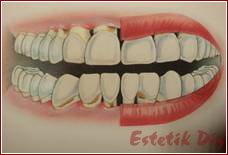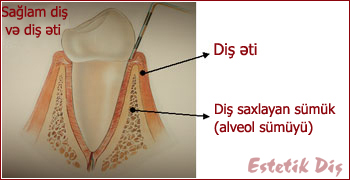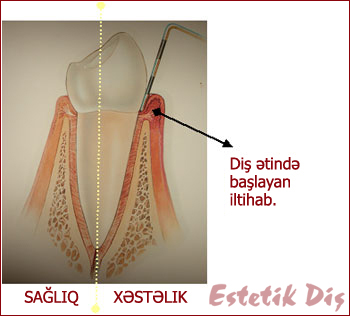
When teeth are not cleaned properly, food debris and bacteria gather on the teeth and in interdental spaces. This soft pile of bacterial deposit is the main reason of tooth decays and gingival inflammation and with the time joining with the saliva it forms tartar.
Microorganisms, formed in the bacterial deposit, create acid, decomposing sweet food. This acid begins to destroy the tooth beginning from a little decay and gradually grows. If not be treated in time, it can cause extraction of the tooth.
The first symptom of the inflammation of gingiva is bleeding of it. Then appear problems with the color, form and a bad breathe. The inflammation of the gingiva causes more tooth losses than tooth decays. First of all, it must be noted that a health gingiva must be in light pink color. It is strongly stuck to the teeth and bone and has an irregular appearance.
Symptoms of gingival diseases:
- The first and the most important symptom of the gingiva is its bleeding. A healthy gingival will not bleed
- Swellings on the gingiva and redness of it,
- Gingival recession and sensitivity on unveiled root surfaces,
- Black spots on gingival edges or in interdental spaces, formed due to dental tartar,
- If pus oozes out between the tooth and gingiva,
- Shuttering of teeth, bleeding in interdental spaces,
- Constant bad taste and bad breath in the mouth,
If you have one or more of the above mentioned symptoms, you should attend the dentist.
What can cause gingival diseases?
The main reason of the gingival disease is a bacteria deposit; it is sticky and transparent layer. If you touch your tooth with your nail, you will feel this layer. In one milligram of this bacteria deposit there are found bacteria from 200 up to 500 billion. Beside it, the below stated factors also impact on the health of the teeth.
· GENETIC FACTORS. According to the researches the genetic compatibility is 30%. Besides it, if oral hygiene is bad, the risk of gingival disease increase up to 6 times. If one member of your family has a problem in the ginigva, you should also be examined.
· SMOKING. As everybody knows, smoking causes diseases as cancer, heart disease and other serious illnesses. Besides all this, smoking is harmful for oral mucosa and teeth. It can lead to softening of gingival and development of gingival diseases.
· USE OF MEDICINE. The medicines controlling birth and heart pills impact on oral health. Because of this, if you use such kind of medicines, you should inform your dentist about it and pay more attention to your oral hygiene.
· HORMONAL CHANGES. In the periods as pregnancy, menopause, menstruation when there occur frequent hormonal changes, one must pay great attention to the oral hygiene. Gingiva is very sensitive in this period and inclined to gingival diseases.
· STRESS. Stress can cause not only hypertonic, cancer and other such kind of illnesses; it also increases the risk of gingival diseases. According to the researches, stress reduces the resistance of the whole organism.
· GRINNING. Grinning of teeth reduces the power between the tooth and gingiva and thus causes destruction of periodontal tissue. One of the reasons of the gingival recession is grinning. If you have it, you must wear a night protector to get rid of this pressing.
· POOR NUTRITION. Poor nutrition reduces the immunity of the body and makes difficult to struggle against infections, including the gingival infections.
· PANCREATIC DIABETES. The patients with diabetes are in the risk group having inclination to periodontal infection. In repeated gingival problems, one must immediately consult a specialist (periodontologist) and pay great attention to the oral hygiene.
· NOT-PROPERLY DONE COVER, BRIDGE AND FILLINGS. Filling that makes pressure on the gingiva causes problem in it.
HEALTHY TOOTH AND GINGIVA
If dental deposit not cleaned, it will harden and form dental tartars. The toxins exuded by bacteria, existing in the dental deposit, do much harm to the gingiva. With the development of the periodontal disease, the pockets get deeper. The tooth deposit sticks to the unveiled root surfaces. The teeth lose their bone bands and if no treatment is conducted, they began to shatter and lost at the end.

WHAT ARE THE OTHER REASONS OF GINGIVAL DISEASES?
Besides the dental deposit, which is the main reason of the periodontal diseases, other factors also can influence to the health of your teeth. The form of nutrition and smoking have a considerable influence of the oral health of a person. Poor nutrition reduces the resistance of the organism and makes it weak to struggle against the infections. Leucosis, AIDS and other such kind of diseases influencing on the host defenses can worsen the state of ginigva. In cases where diabetes is not under control, the gingival disease becomes stronger and it becomes hard to control it. Hormone changes during pregnancy causes reddening of the gingival. The gingival disease in an early stage can become stronger during pregnancy.
Keep your dentist in the course of changes happening in your mouth.

HOW THE GINGIVAL DISEASES ARE EXAMINED?
When dentists are suspicious about the general appearance of the ginigva, they measure the length of gingival pocket via an instrument called periodontal probe. X-ray can be made to estimate bone tissues around the teeth.
HOW CAN WE AVOID GINGIVAL DISEASES?
It is possible to avoid periodontal diseases. In order to keep your teeth in your mouth life-long, you should clean dental deposit, to brush your teeth and use a dental floss. In addition to all these, to attend the dentist regularly is also a condition.
Teeth cleaning carried out by a dentist provides elimination of dental deposit and dental tartars in the regions which you can not access by a toothbrush. Your dentist can arrange a special personal leaning plan suitable for the condition of the needs of your oral hygiene. After the treatment you should check the existence of periodontal disease periodically
WHO DOES THE PERIODONTAL TREATMENT?
All the dentists can determine periodontal diseases and treat them in an early stage. But there are also specialists who are qualified and experienced enough to treat even complicated periodontal diseases. These specialists are called periodontologists.